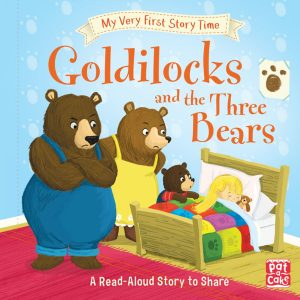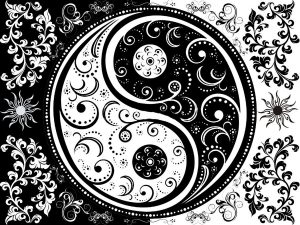“There is a fifth dimension beyond that which is known to man … a dimension as vast as space and as timeless as infinity. It is the middle ground between light and shadow, between science and superstition, and it lies between the pit of man’s fears and the summit of his knowledge. This is the dimension of imagination.” (Rod Serling)
Goldilocks and the Middle
Most of us grew up hearing, or reading fairy tales, and Goldilocks and the Three Bears is a staple. And although the original Robert Southey version is about a “naughty old woman” who is depicted in an overwhelmingly negative manner, over time, the story transmogrified into a mischievous young girl with blond hair, hence “Goldilocks.”
Putting aside the editorial changes, Goldilocks and the Three Bears offers some unexpected psychological insight for pondering and philosophical grist for chewing. And I don’t mean the obvious interpretations: “don’t be selfish/consider your impact upon others”; or, “don’t take what doesn’t belong to you (no trespassing).
Of course, as a lifelong educator, I do want children to observe these themes so they become less selfish and more sensitive to other’s needs.
But I also believe that Goldilocks and the Three Bears is a cautionary tale about choosing moderation over excess, about seeking the middle.

Recall that Goldilocks was happiest, or at least most satisfied when she chose things that were “just right,” or in the middle range of choices. It’s no revelation that we live in a politically charged environment, one that polarizes people to the point of constant conflict. John Avlon, a senior political analyst for CNN puts it plainly in his opinion piece, Polarization is poisoning America. Here’s an antidote:
Polarization is killing our country. It is weakening our political and social bonds, separating our economic fortunes and driving bitter cultural divides. Hyper-partisanship is poisoning our politics, making our democracy seem increasingly dysfunctional. A fixation on our differences is fracturing us into warring tribes, threatening to turn our country into little more than a collection of grievance groups who believe that folks on the other side of the divide are the ones really tearing our nation apart.
Ironically, this polarization is not originating from the center of our political spectrum, where the vast majority of voters reside; rather, it insidiously emanates from the fringes of our culture and is driven forward by a minority of people on the extremes of our society.
Extremes Kill the Center
Ian Shapiro, Sterling Professor of Political Science, frames the issue this way: “The main infirmity is that the United States has very weak political parties. They are weak because they are subject to control by unrepresentative voters on their fringes and those who fund them.”

In other words, the agenda of the few are dominating the airwaves and the politics of the many.
Shapiro goes on to pin the blame on the structure and function of American primaries. “It’s due to the role of primaries at the presidential level and the interaction of primaries and safe seats in Congress. Primaries are not new; we’ve had them since the Progressive era. The basic problem with them today is they are usually marked by very low turnout and the people on the fringes of the parties vote disproportionately in them.
But I suspect this goes deeper than just our political system. When people disown family members and friends just because they voted for a candidate from another party, something is terribly wrong. At some point, we have to ask the question, “What’s compelling us to act in such divisive ways?” The answer is, in a word, tribalism.
Zid Jiliani and Jeremy Adam Smith, writing for Greater Good Magazine, capture this concept succinctly: “The force that empowers polarization is tribalism: clustering ourselves into groups that compete against each other in a zero-sum game where negotiation and compromise are perceived as betrayal, whether those groups are political, racial, economic, religious, gender, or generational.”
Labels and the Center
We are simply obsessed with labels and seem to take comfort in labeling. At its core might be a coping mechanism. We live in an increasingly complex world. Thanks to the internet, with just a few clicks, we are bombarded with information, some of which is potentially conflicting, leaving us likely more confused than before we started looking something up.
The only way to effectively deal with the onslaught of information is to insulate ourselves in a form of an intellectual bubble, a self-contained system that affirms our beliefs and suppositions about the world.
Brooke Shelby Biggs makes this point in her article, Do You Live in a News Bubble?, stating: “Forty years after the birth of 24-hour cable news and 25 years since the dawn of the web, we might ask ourselves: Do more voices always mean greater diversity? Does a greater volume of information necessarily get us closer to the truth? The sheer volume of information available at our fingertips in the 21st century — both good and bad — is far too vast for us to manage efficiently on our own.”
As a result of this information overload, it’s not unreasonable for people to intellectually downshift by assigning a label to a person or group instead of getting to know them in a more meaningful manner. Biggs goes on to identify the culprit: algorithms used by search engines, and websites, especially social media sites.
Labels and Algorithms
Biggs points out that the “ . . .result of an algorithm-mediated information diet is two-fold. First, because we all experience the world through media uniquely molded by our own predilections, we no longer have a common experience or understanding of the world. ‘Where were you when you heard President Kennedy was shot?’ has been replaced by ‘did you see that viral video?’ or ‘vaccines are a conspiracy; look it up.’”
So what is the connection to labeling? Labels help us condense complex people and difficult issues into a category, one that we either resonate with, or we find objectionable. Either way though, we are missing out on not only learning something meaningful about others, but challenging our own preconceptions and world views. Through labeling, we create more bubbles to contain and reduce the essence of others, all the while maintaining our own personal bubble.
The end result is that we are easy to dismiss anything that doesn’t fit our preconstructed schemas, something labeling does efficiently, if not elegantly, at least in the moment. In the long run, however, beyond the obvious conflict and disharmony we harness, we do irreparable damage. Art Markman, Professor of Psychology and Marketing at the University of Texas at Austin has this to say about the unintended consequences of labeling:
“If you use terms to describe people—and you believe that they cannot change—then your life can be stressful. Every time that someone treats you badly, you take that as evidence that they are a bad person, and not just that they are a possibly good person who just happened to do a bad thing. If you are able to think about people’s personalities in a less fixed way, perhaps that would decrease your overall stress.”
So, in the end analysis, we don’t end up reducing our stress, but rather magnifying it. Markman’s conclusions about stress and inflexible thinking (i.e. labeling) are based on experimental data, but I suspect there is something more at play.
Because while bubbles protect us from foreign ideas contaminating our consciousness, they also isolate us from new experiences and the possibility of enlightenment, of learning something so new and profound that our psychological planets are forced into a new alignment.
At this point you may be asking, “What the hell does this have to do with Goldilocks, for God’s sake?” Let me circle back. Recall the phrases “just right,” or “in the middle range” I proposed earlier. When you shun extremist viewpoints, you gravitate toward the middle. And the middle is always where wisdom resides.

As Buddhism states, “ “The Tathagatha (person) avoids the two extremes and talks about the Middle Path.” When we aim for the center, the middle path, we by necessity throw off labels and judgments, forcing us to connect to the heart of other people, which symbolically lies in the center of our spiritual self, and is literally located in the center of our chest, our physical self. This is the ultimate act of psychological liberation, and something we must start practicing if we want more harmony in the world.
The next time you catch yourself engaging in labeling as a cognitive shortcut, remember these words of the tennis great, Martina Navratilova: “Labels are for filing. Labels are for clothing. Labels are not for people.”
Your opinion matters. Please share your thoughts in our survey so that Newsweed can better serve you.
Are you a budding poet? Enter our poetry contest for bragging rights and an opportunity to win some cash!






